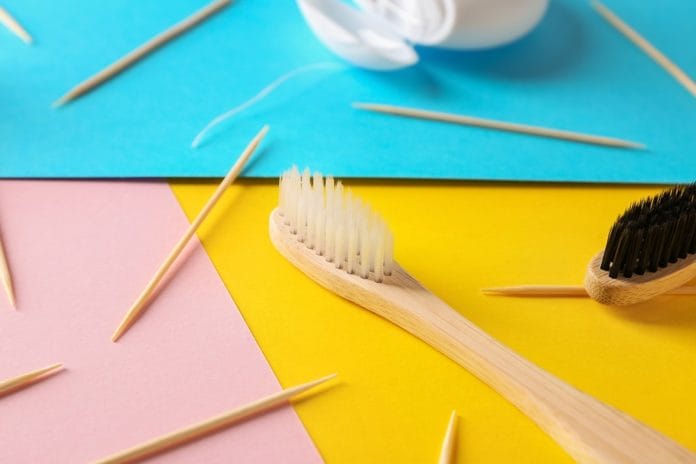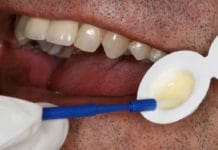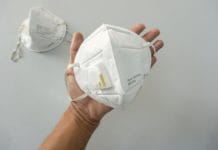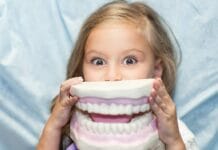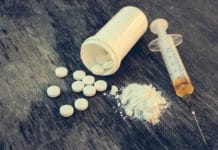Hey, all you floss-loving, pick-loving, tooth-brushing enthusiasts, we have a problem here! How often are you in a parking lot and see a discarded floss pick lying on the pavement? It happens all the time. People toss garbage as if it doesn’t matter. We need to educate our patients on excellent home care as well as the proper disposal of those products, including tips for more environmentally-friendly options if desired.
Most floss is made of nylon, a petroleum-based product that is not biodegradable. Typical floss is virtually impossible to recycle and ends up either being burned and polluting the air or in landfills polluting soil and groundwater. When flushed, floss gets into sewer systems, causing potential blockages. If floss gets in waterways, it is a serious danger to marine life, causing choking and foreign body obstructions.
Multiple dental blogs have suggested that used floss could be recycled for animal nests. Veterinarian Dr. Jessica Manassa emphatically disagrees, “No, that is simply not true! Flavored flosses, in particular, are hazardous as hungry animals will mistakenly think it is food, ingest it, and could get gastrointestinal obstructions, which can lead to death. Or those with a sharp pick can perforate the intestine, esophagus, or stomach also causing death.” Birds and wildlife have been found dead with floss picks in their stomachs.
Dr. Manassa also is concerned about xylitol flosses and products found in nature since xylitol is poisonous to dogs and cats and likely poisonous to wildlife, “causing a drop in blood sugar so low they can seize and die before medical attention is even a possibility.” Xylitol can also cause liver failure in animals, so it is suggested that patients are cautioned whenever a recommendation for xylitol is offered. According to the ASPCA Animal Poison Control Center, xylitol poisoning calls “hit a staggering 6,760 cases…a new average of over 18 calls per day!”
Environmentally Friendly Alternatives
The plastic packaging for floss containers is not easily or frequently recycled. Most often, we offer patients samples of floss products with a short-term supply, creating so much wasted plastic.
The good news is that the floss industry is slowly changing, and there are more eco-friendly and healthy options becoming readily available. Currently, we can offer silk and bamboo floss that is both biodegradable and chemical-free, making them great options for the patient and the planet.
Floss was initially created with silk fibers due to its natural nature. Most silk floss today does not contain beeswax but uses a plant-based candelilla wax rendering it vegan. (Please note some silk harvesting techniques kill the silkworm creating yet another issue.) Silk floss can be found that is both vegan and animal-friendly with a quick Google search. Bamboo dental floss is preservative-free, gluten-free, and free of dyes, while some options include activated charcoal, essential oils, and peppermint.
Bamboo or silk, your choice, but both biodegradable, chemical-free, and animal-friendly, and both can be found in refillable glass containers, creating virtually zero waste.
Floss picks seem to be an easier option for many patients. There are brands currently available that are both biodegradable and sustainably sourced. If we are offer single-use items, isn’t it best knowing that we are not adding to the already crowded landfill? Let’s give patients options to improve their own health and increase opportunities to impact the world at the same time!
As practitioners, the time has come for us to really think about our impact on the planet with our single-use products and plastic take-home bags. Not every patient even needs or wants a manual toothbrush as they may currently be choosing an electric brush. Tiny floss samples create loads of plastic waste for such short-term use, and some samples can now be found on cardboard in paper packaging to reduce waste and be easily recycled. Consider no bag or paper options to store patient products, and at the very least, we can ask patients specifically what products they need to take with them and remind them to dispose of properly for the health of our animals and planet.
Now Listen to the Today’s RDH Dental Hygiene Podcast Below:
References
- Eco-friendly Dental Floss: Safe Alternatives (Plastic-free & Biodegradable.) The Sustainable Citizen. June 16, 2019. Retrieved from https://citizensustainable.com/dental-floss/
- Biodegradable vs. Compostable – Differences, Similarities & Examples. The Sustainable Citizen. June 16, 2019. Retrieved from https://citizensustainable.com/biodegradable-vs-compostable-examples/

